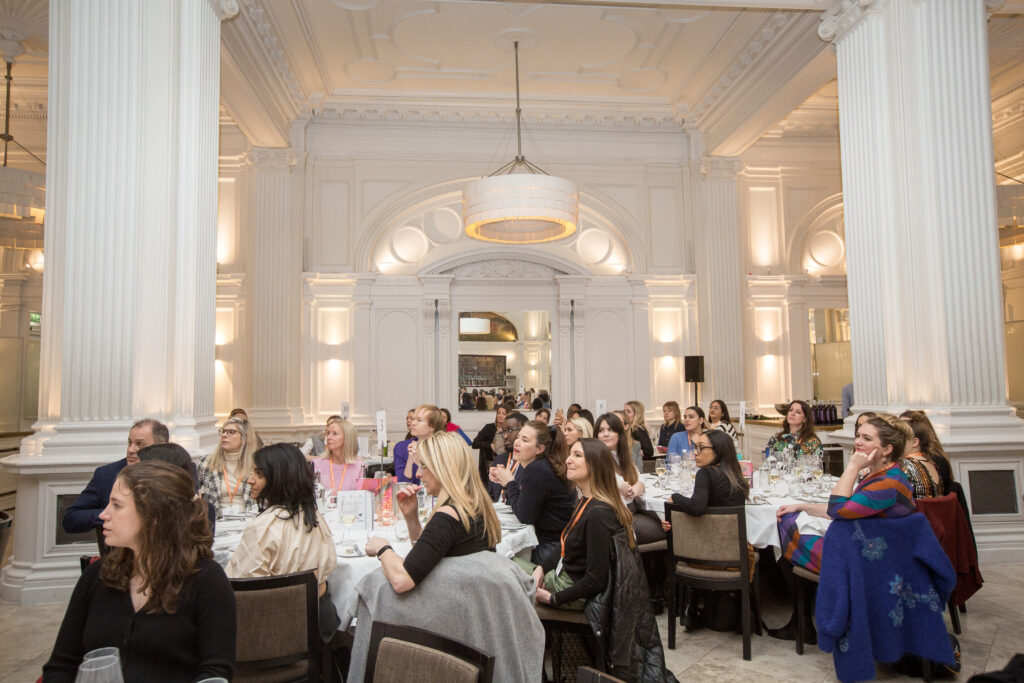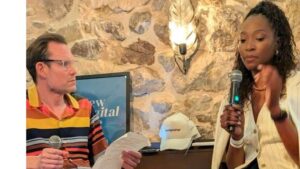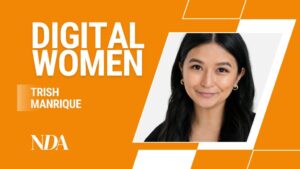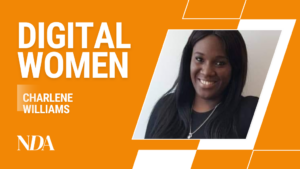New Digital Age’s Digital Women initiative hosted its inaugural International Women’s Day lunch to celebrate women in the industry on 8th March 2023. Celebrating the inspirational women in the digital media and marketing industry, Digital Women is a joint initiative by New Digital Age and Ellie Edwards Scott and Lisa Menaldo of The Advisory Collective. With over 120 women and allies brought together to discuss how to further improve female representation in digital, a panel of leading women in the industry shared their thoughts.
First up, keynote speaker, Adah Parris, revealed that it was, in fact, also the third anniversary of the manifesto that she had written for International Women’s Day in 2020. That manifesto sought to be a rallying cry and a movement that was truly inclusive of what Parris calls “the beautiful diversity of the identities, cultures, experiences, knowledge and wisdom of womxn”. It recognised that, in an increasingly digital age, we mustn’t lose sight of what it is to be human. The manifesto also sought to challenge what society labels as feminine or feminist, a society that tends to pit women against each other, rather than unite them.
And the conclusion of that manifesto set the tone for the rest of the event, with Parris urging “let us gather together in trust, transparency and culture around the fires real or digital, and harness that collective intelligence, wisdom and knowledge.”
What does that mean in practice? For Parris, it’s stepping outside the comfort zone, noting that you have to check your ego and live your values – for example, if you support diversity but that’s not reflected in your social groups, then something is wrong. Being immersed in your environment, seeking to inform yourself on others’ lived experiences and pulling together is what will help women achieve their full potential, individually and as a collective, in the future.
Ellie Edwards Scott, also Co-Founder of The Advisory Collective, went on to introduce the panel by talking about what the Digital Women organisation can do for women in the digital sector. She encouraged attendees and their networks to participate in the content hub and wider events (noting that not every event had to be a lunch for 120 people!) – and in the wider world in general. “Get your voices out there” was her rallying cry.
The panel itself was made up of four women who are each leaders in their own fields but Edwards Scott invited them to reflect on their formative years first – what perhaps lit the fire within them. Angela Tangas, Group Chief Executive Officer, Dentsu revealed that her tipping point was helping her mother start her own fashion design company and working with people from diverse cultures.
For Hollie McLellan, Director of Customer Marketing, Boots, it was driving through Canary Wharf and thinking “I want to work there”, studying hard for an investment banking career – then hating it. Her moment of clarity was that, at points in our career, it hasn’t turned out exactly as we thought it would: “It made me sit down and think about what I enjoy doing”.
Emily Roberts, Co-Founder, The Women in Programmatic Network took a less conventional approach, starting out on the shop floor at John Lewis. But it was the company’s iconic advertising and its power that inspired her to change lanes through an apprenticeship at Google and latterly working at PWC. Being one of only two women at a conference in Hungary inspired Roberts and a friend to co-found the Network which now has 3,000 members.
Working in outdoor, Lucy Cutter, Trustee, Bloom UK, wanted to find “her crew” in a sector that is typically very male heavy, “particularly at the top”, joining Bloom five years ago. Navigating personal issues at the same time as transforming Bloom into a not for profit organisation took Cutter out of her comfort zone but it also showed her how to be proud and upfront about her success and strengths.
While many scoff at the idea of a single day to champion women’s achievements, the panellists felt it does serve a purpose. For McLellan, it’s a yardstick to measure progress but “women’s health is a challenge all year round. IWD is a nice opportunity to give it more focus.”
Tangas feels it’s a reminder of how individuals can evolve: “Change is made of people; growth is made of people, so we must be in tune with what our people need.” However, Roberts points out events like this can also shine a light on the lack of progress: “One study found there are now 10% more women than men in the ad industry, but the gender pay gap is 17.5% [in men’s favour].” She also pointed out that the IPA found 72% of men were Chief Digital Officers, compared to 28% of women.
There’s clearly an opportunity to develop upcoming talent and to put them forward on a more equal footing. “The challenge we have right now is we’re not spending enough time cultivating the next generation. We need to be cultivating the Gen Z community now. Digital skills is something we need to spend more time on,” Tangas warned.
Both Cutter and McLellan agreed that apprenticeships could be critical in getting the next generation on board, specifically with digital skills, as well as using reverse mentoring to address the gender balance by using Bloom members who are assigned a senior male leader in the industry to co-mentor. “It’s about breaking down those gender barriers in the workplace,” Cutter insists. “There are lots of raw, open, honest conversations.”
“We need to break the stigma that women aren’t interested in technology,” Tangas concluded. “Even while thinking about those opportunities, I often think that there’s still an unconscious bias in the system.”
McLellan revealed the importance of the female perspective behind initiatives: “There’s a big opportunity for female digital products. Talking about the morning after pill or HRT, people don’t feel they can do that in a normal environment so digital has a role to play helping women access healthcare.”
Roberts added that it’s important not to make assumptions. “Gen Z is normally very good at digital in real life but the IPA report said most ad agencies are made up of 30-40 year olds, 30% of which are women. That drops by half once it’s over 40.” She highlights the Brixton Finishing School’s initiative to bring midlife women back into the industry.
Edwards-Scott drew the session to a close with one more plea to the audience: “The message is – reach out to us, because we can do more to help together, and collectively we can rise. That’s the key to our happiness”.










